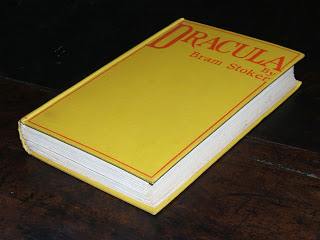Archibald Constable and Company, 1897. EL3
.S874d 897
Although his most renowned literary creation was famously “un-dead,” Bram Stoker was as mortal as the rest of us and today marks the centennial of his death on April 20, 1912.
Here is a link to his obituary, as printed in The Times of London. It remembers him primarily as the friend and assistant of Henry Irving, whose Lyceum Theatre he managed (and managed well, supervising a staff of 128), but it had this to say about his writing:
“A fluent and flamboyant writer, with a manner and mannerisms which faithfully reflected the mind that moved the pen, Stoker managed to find the time, amid much arduous and distracting work, to write a good deal. He was the master of a lurid and creepy kind of fiction, represented by “Dracula” and other novels; he had also essayed musical comedy, and had of late years renewed his connexion with journalism. But his chief literary memorial will be his Reminiscences of Irving, a book which with all of its extravagances and shortcomings–Mr. Stoker was no very acute critic of of his chief as an actor–cannot but remain a valuable record of the workings of genius as they appeared to his devoted associate and admirer.”
If you are interested in commemorating Stoker by reading what actually turned out to be his “chief literary memorial” you can find the Project Gutenberg e-text of Dracula here. You can also download some of Stoker’s other novels, including Lair of the White Worm, The Jewel of Seven Stars, The Lady of the Shroud, and The Man. You can find links and downloads for the remainder of Stoker’s twelve novels, as well as his short stories, and his non-fiction Personal Reminiscences of Henry Irving at BramStoker.org. There is also a nice set of articles available online from the Irish Times, which explore Stoker’s connection to Dublin and his literary interest in technology, among other topics.


